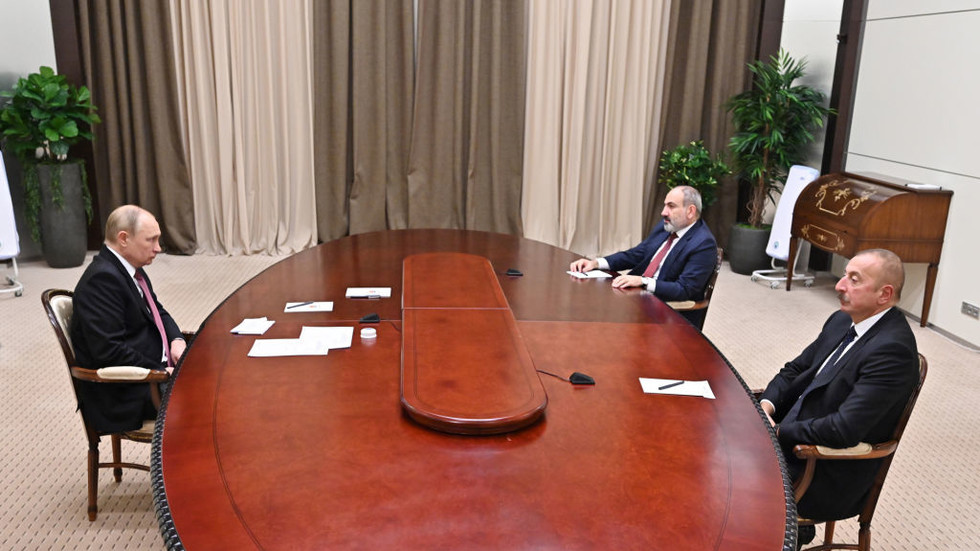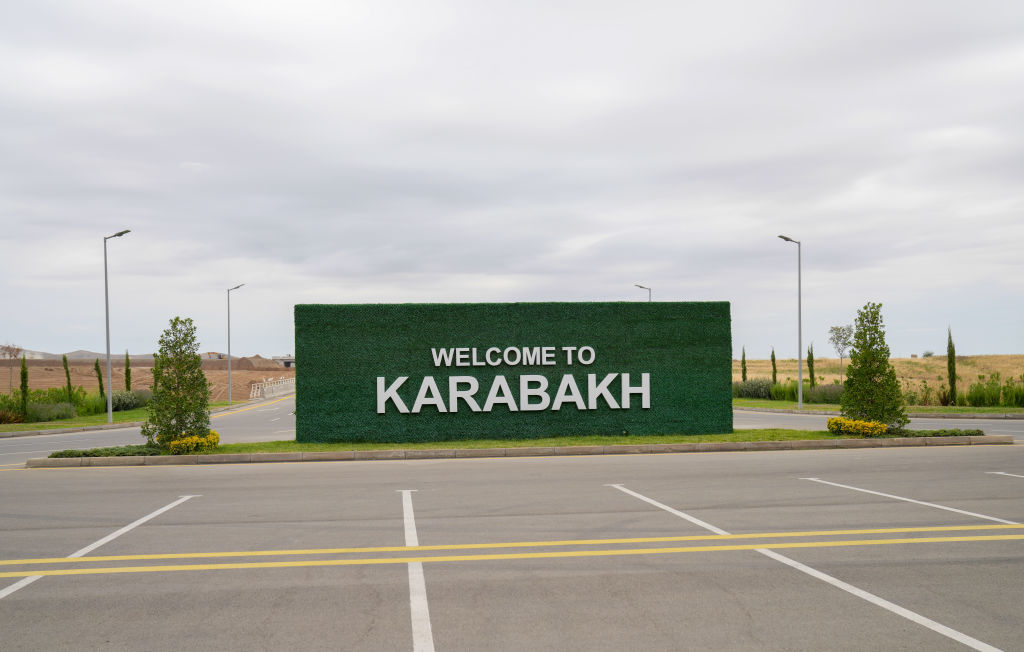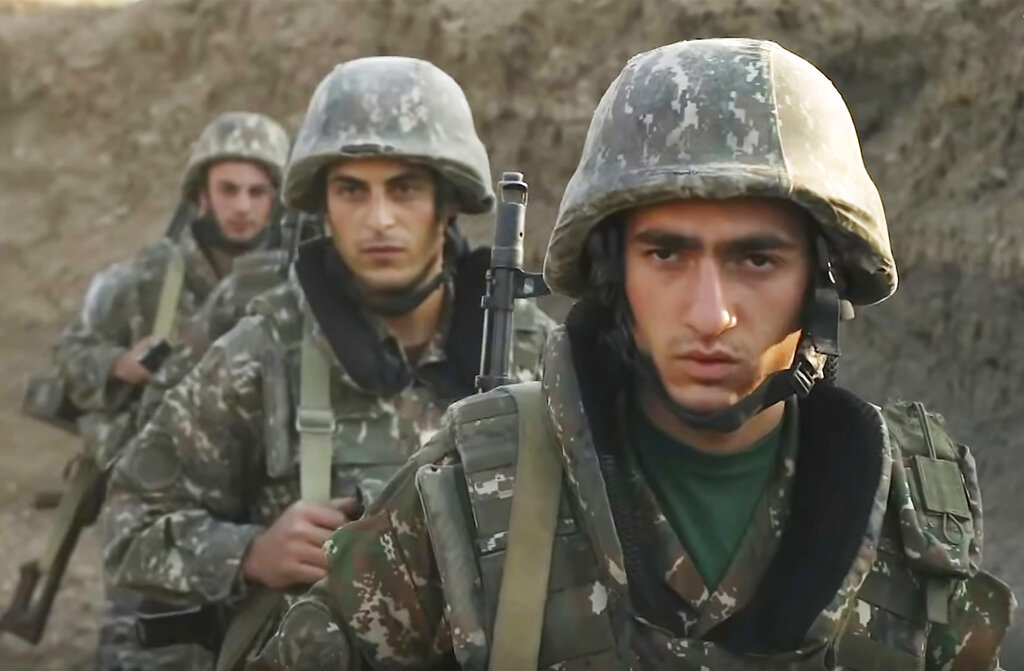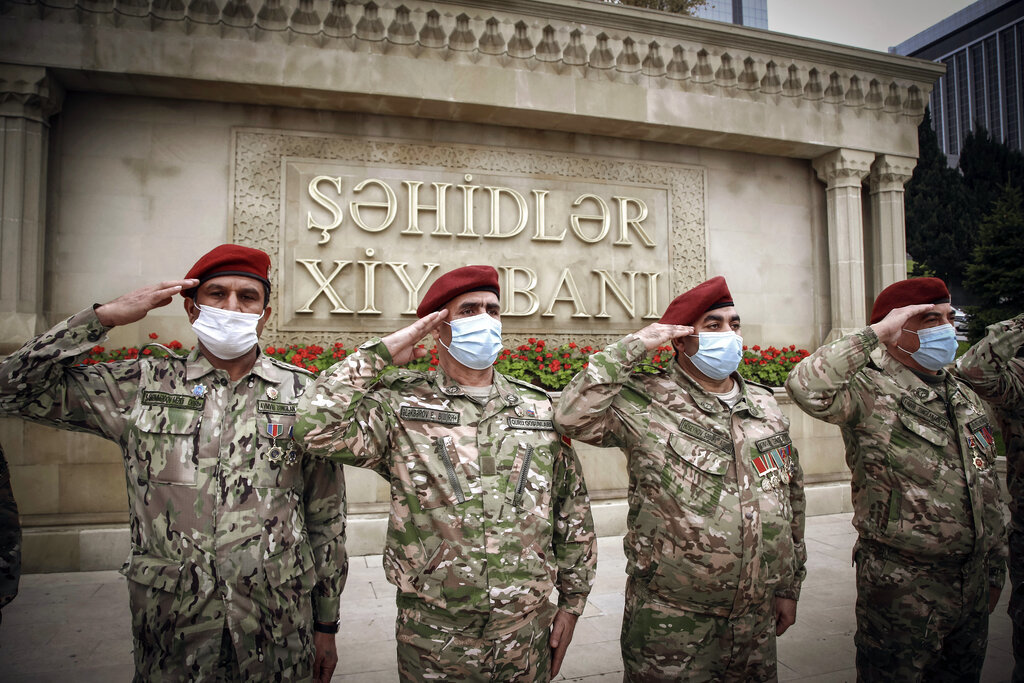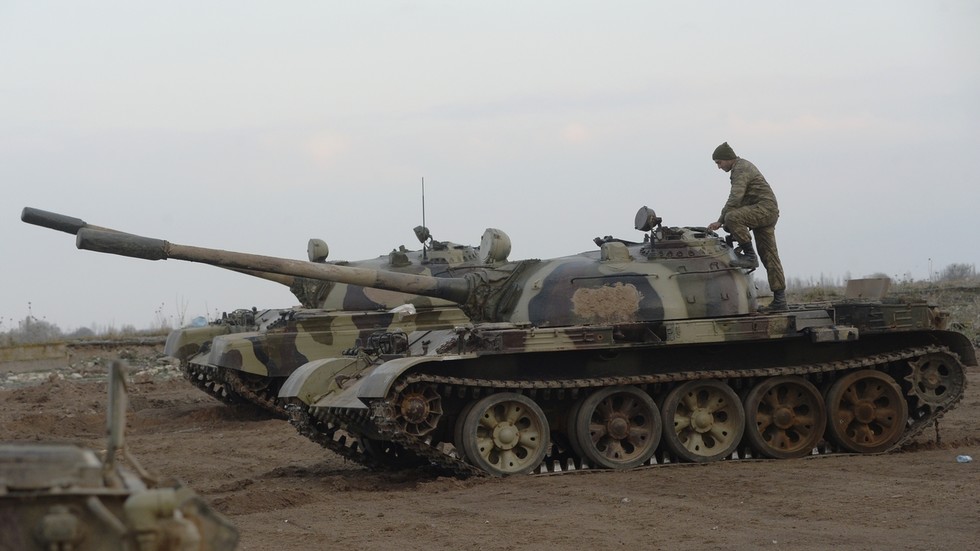15 Sep, 2023 14:56
‘An explosive situation’ near Russia’s southern borders: Could a new war erupt between Armenia and Azerbaijan?
Tensions between Baku and Yerevan mount again,
against a background of increasing US and EU activity in the region
The situation in the South Caucasus is once again becoming tense, as the long-term conflict between Armenia and Azerbaijan over Karabakh is on the verge of escalating into another hot war.
Almost every day the two sides open fire at each other and exchange accusations. Last weekend, Baku
reported that Armenia had fired at its army, while just several hours later, Yerevan
said that its own forces had been attacked. The events are unfolding against the background of Armenia’s joint military
exercises with the United States, which will continue until September 20 – a fact that, in turn, has
perplexed Russia.
The EU has also intervened in the situation and is actively holding talks with both Yerevan and Baku. For its part, Moscow
believes that Brussels is responsible for escalating the conflict in the region.
The trigger
Over the past few years, Baku and Yerevan have repeatedly
discussed signing a peace agreement which would officially determine the borders of the two countries. Just a few months ago, Azerbaijani President Ilham Aliyev
said “there is virtually no serious obstacle to a peace treaty… I am sure that a peace treaty can be signed in the near future.”
However, earlier this month, the conflict between the two countries escalated once again. Armenian Prime Minister Nikol Pashinyan
said that on September 1, the Azerbaijani armed forces had
“launched another provocation” in the Sotk-Khoznavar area of Syunik Province in southern Armenia, and three Armenian soldiers were killed as a result.
Baku, however,
claimed that one of its serviceman was wounded by fire from the Armenian side. Later, the Azerbaijani Defense Ministry reported that the Armenian Armed Forces used a drone to attack the Azerbaijani army at the border, and that two other soldiers were wounded.
The Azerbaijani Ministry of Defense also stated that Yerevan attacked the Azerbaijani army using mortars, artillery, and drones.
Both sides accused each other of aggravating the situation. Baku claimed that the Armenian side is publishing false information and trying to
“form a false opinion in the international community to prepare the ground for another provocation”.
Growing tension
A few days later, several
videos showing huge columns of Azerbaijani military equipment moving towards the border with Armenia appeared on the internet, sparking active discussions. Pashinyan
insisted that Azerbaijan was accumulating military forces on the border and in the Karabakh region, while allegedly continuing to lay claim to Armenia’s sovereign territory. He also cited, what he called, the growing number of anti-Armenian statements that incite hatred in the Azerbaijani press and on propaganda platforms.
A general view from Azerbaijan's Shusha, 2023 Cultural Capital of Turkic World as reconstruction and restoration works continue on July 30, 2023. © Selcuk Acar/Anadolu Agency via Getty Images
According to Pashinyan, the situation on the border is ‘explosive’. He called on the global community to take urgent measures to prevent a further escalation of the conflict.
Meanwhile, the Azerbaijani Foreign Ministry
described statements about the concentration of Azerbaijani forces on the border as
“political manipulation.” Azerbaijani diplomats noted that
“the continuation of military-political provocations by Armenia, ongoing claims voiced by Armenia including its prime minister against the territorial integrity and sovereignty of Azerbaijan, and the non-withdrawal of the Armenian armed forces from the territories of Azerbaijan, contrary to its obligations, are real threats to security in the region.”
“In order to establish peace and security in the region, Armenia must abandon its territorial claims against Azerbaijan, put an end to military and political provocations, and stop the obstacles to the successful outcome of the negotiation process on the peace treaty,” the Azerbaijani Foreign Ministry commented.
The essence of the conflict
The conflict between Armenia and Azerbaijan over Karabakh – territory which legally belongs to Azerbaijan but is inhabited mainly by Armenians – has been going on for several decades.
In the latter years of the USSR, the influence of the central authorities grew weaker and ethnic conflicts sprang up in the region, just like in other remote parts of the huge country. These conflicts soon turned into bloody clashes. In 1988, the Nagorno-Karabakh Autonomous Oblast declared its secession from the Azerbaijani SSR. In the last months of the Soviet Union’s existence, the Nagorno-Karabakh Republic (NKR) was proclaimed, but was not recognized by any UN member state, not even Armenia. The territorial dispute led to an armed confrontation between the subsequently independent Armenia and Azerbaijan, and the conflict remains unresolved to this day.
During the 1992-1994 military conflict, Baku lost control over Karabakh and seven adjacent districts. This allowed Armenia to both defend the
“independence” of the self-proclaimed NKR and create a so-called “
security belt” around Karabakh. According to various estimates, as a result of the armed conflict, 4,000-11,000 people were killed on the Azerbaijani side and around 5,000-6,000 people on the Armenian side. For the past 30 years, there has been an ongoing attempt to resolve the situation within the framework of the OSCE Minsk Group (involving Russia, the US and France), and in the course of meetings between representatives of Armenia and Azerbaijan, but this has not yielded results.
The situation changed as a result of the Second Karabakh War, which began in September 2020. During the 44 days of active hostilities, the Azerbaijanis managed to take control of a significant part of their territories south of Karabakh and the strategically important city of Shusha. Control over this city made further attempts to continue the war virtually meaningless.
The war ended on November 9, 2020, when Russian President Vladimir Putin, Azerbaijani President Ilham Aliyev and Armenian Prime Minister Nikol Pashinyan signed a joint statement on the complete cessation of hostilities in Karabakh. According to the document, Baku restored control over most of the territories it lost in the 1990s, and Russian peacekeepers were deployed along the line of contact and in the Lachin corridor, which links Armenia with the unrecognized NKR.
Nevertheless, a peace agreement between Armenia and Azerbaijan has not been signed to this day.
“Corridor wars”
In March of last year, Azerbaijan proposed five
conditions for a peace agreement with Armenia: mutually recognizing state borders, confirming the absence of territorial claims, refraining from the use of military force and threats of force, demarcating the Armenia-Azerbaijan state border, and opening transport communications. Among other things, this included the opening of the Zangezur corridor – a route that would pass through Armenia’s Syunik province and connect Baku and the western regions of the country with the exclave of Nakhchivan. The road would then stretch further to Turkey, and over time, would lead Armenia out of the transport isolation which it has found itself in since the First Karabakh war.
The trilateral ceasefire statement of November 9, 2020 includes a paragraph
stating that Russian border guards will control the Zangezur corridor. By signing the document, Azerbaijan, Armenia, and Russia agreed that the corridor would be extraterritorial.
Despite this,
Armenia began boycotting the project, viewing it as a threat to national security. Armenian authorities explained that their fears were based on Azerbaijan’s occasional
remarks that Syunik province is historical Azerbaijani land. In July, Pashinyan
stated that “
Armenia has never, neither verbally nor in writing, assumed any corridor obligation and will not accept any such interpretation.”
FILE PHOTO: In this image taken from video released by the Armenian Defense Ministry on Wednesday, Sept. 30, 2020, Armenian solders guard their position in the self-proclaimed Republic of Nagorno-Karabakh, Azerbaijan. © Armenian Defense Ministry via AP
When the Zangezur Corridor project was de facto frozen, Azerbaijan focused on another transportation artery ensured by the trilateral agreement: the Lachin corridor, which connects the unrecognized NKR with Armenia.
Since the winter of 2022-2023, Baku has issued a series of
“warnings” about the inadmissibility of delaying peace talks, Meanwhile, Armenia claimed that Karabakh had fallen under a
“blockade.” The authorities of the unrecognized NKR have blamed Baku for cutting off
natural gas supplies, the only source of heat for thousands of civilians. Armenia then
accused Azerbaijan of blocking access to numerous trucks with humanitarian aid.
Azerbaijan denies responsibility for the
“blockade,” and local media
show cars with Armenian license plates moving in both directions. Moreover, Azerbaijani authorities have offered to transport food and medicine along an alternative route.
Mutual accusations
While Armenia accuses Azerbaijan of provoking a humanitarian crisis in Karabakh, Azerbaijan accuses Armenia of sabotaging the agreements.
Moreover, there is still the unresolved problem of non-Azerbaijani military formations stationed in Karabakh, whose withdrawal is provided for by a tripartite agreement. “Although Armenia was forced to recognize Karabakh as part of Azerbaijan, there are still remnants of the Armenian armed forces on the territory of Azerbaijan, where Russian peacekeepers are temporarily stationed,” President Aliyev said in July.
Armenian Prime Minister Pashinyan
replied that no representatives of the Armenian Armed Forces remain in Karabakh, however, the Artsakh Defense Army (the Armenian name for Karabakh) is still stationed there. According to Pashinyan, the Artsakh Defense Army has not been disbanded because of Baku's policy. He also stated that Armenia's peacekeeping attempts did not lead Azerbaijan to take any symmetrical steps. For example, according to Pashinyan, Yerevan handed over maps of minefields to Baku, which allowed Azerbaijan to start large-scale mine clearance work. “
Azerbaijan took no adequate step in response,” he said.
Put together, all these factors not only prevent the possibility of concluding a peace agreement, but also escalate the conflict. A very dangerous situation is currently brewing on the border of Armenia and Azerbaijan, says Nikolai Silaev, senior researcher at the Center for Caucasus and Regional Security Issues at MGIMO.
“The situation is explosive, but all is not lost. In order to de-escalate it, it is necessary to fulfill all the terms of the tripartite declarations, starting with the declaration signed in November 2020. I don't see any other way of preserving peace,” the analyst told RT.
External influence
Meanwhile, the rift in relations between Moscow and Yerevan – which turned to the West for support even before the escalation started – has grown drastically. In January, EU foreign ministers approved the creation of a civilian EU mission in Armenia to “
promote de-escalation in the Caucasus.” The stated
goal is to increase stability and confidence in the border areas of Armenia and create an environment conducive to the normalization of relations between Armenia and Azerbaijan. EU Foreign Affairs chief Josep Borrell noted that the establishment of the EU mission in Armenia
“launches a new phase in the EU’s engagement in the South Caucasus”.
On May 1, Armenian Foreign Minister Ararat Mirzoyan and Azerbaijani Foreign Minister Jeyhun Bayramov had their first meeting in a long time, organized by US Secretary of State Antony Blinken near Washington.
FILE PHOTO: Azerbaijani soldiers salute their dead comrades at the Honorary Alley and the Alley of Martyrs as they pay them their last respect in Baku, Azerbaijan, Friday, Dec. 4, 2020. © AP Photo
No concrete actions were proposed on the issue of the
“blockade.” Nonetheless, the US side demanded to unblock the corridor, hoping to obtain Yerevan’s support in the long term.
Moscow noticed the gesture and was obviously irritated, seeing in it the West’s desire to settle the conflict on its own terms.
“There are no other legal grounds yet that would contribute to the settlement [of the situation] so there is absolutely no alternative to these tripartite documents. We know as well that there are various attempts that undermine the foundations of the settlement, which may not yield results in the future,” said Dmitry Peskov, the Kremlin press secretary, in May.
By the beginning of September, the contradictions intensified. They were triggered by the Armenian Defense Ministry’s statement regarding plans to hold joint US-Armenian military exercises “
Eagle Partner 2023” at the Zar Training Center in mid-September.
This was preceded by a scandalous interview given by Armenian Prime Minister Nikol Pashinyan to the
La Repubblica newspaper. Speaking to a French journalist, the politician said Russia is unwilling to resolve the crisis and lift the Karabakh
“blockade.” Moreover, Pashinyan said that the peacekeepers are incapable of fulfilling their mission when it comes to ensuring civilian security and countering Baku's plans to expand the controlled territory.
These statements did not go unnoticed by Russia. In response to the prime minister's statement, Russian Foreign Ministry Spokeswoman Maria Zakharova called the Karabakh “blockade” “a consequence of his own actions.” She also called the Armenian leader a “bad dancer” who tries to shift the blame for the current situation onto its historical ally.
“What Pashinyan is doing is clearly provoking the current situation. I do not know why he is doing this. Perhaps he was taught so by the bad boys from the European Union,” Alexey Martynov, Director of the International Institute of the Newly Established States, told RT.
By Christina Sizova, a Moscow-based reporter focused on politics, sociology and international relations



